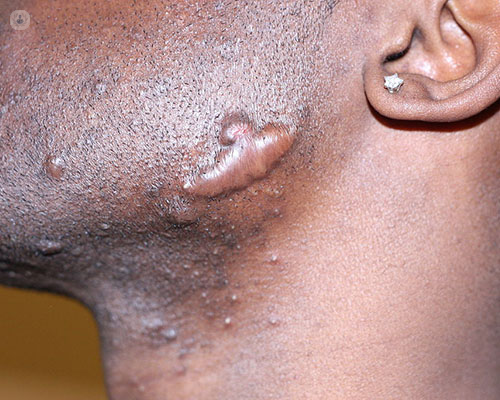Which route is right for me? How to banish acne scars
Written by:What is acne?
Acne is a pretty common skin condition that affects most people at some point in their lives. It can affect many parts of the body, but it more commonly affects the face, chest, and back. Many people feel it is unsightly, and it can cause severe distress for the sufferer, even in cases which are not severe. Acne cannot be cured, but it can be treated.
How are acne scars formed?
After acne clears, sometimes it leaves traces behind in the form of scarring. Acne usually occurs when the pores in the skin become clogged with oil, bacteria, or dead skin cells. If the break in the pore is particularly deep, the infected matter inside the pore can spill out and affect the area around it too, damaging the skin.
What kind of scars does acne cause?
There are different types of acne scar:
- Rolling scars: scar tissue forms under the skin, which causes the skin to look uneven in appearance
- Ice pick scars: these scars come in the form of small, deep holes which look as if the skin has been punctured
- Boxcar scars: depressions in the skin, which are round or oval, and make the skin look pitted
- Keloid scars: these scars occur when the skin creates an excess of collagen fibre, and they come in the form of a raised mass of tissue, which is often larger than the original spot. These scars are also called hypertrophic scars

How is acne scarring treated?
Acne scars can be treated in different ways, and usually treatments are done through a dermatologist, as they are considered to be a type of cosmetic procedure. Some of the most common treatments offered by dermatologists include:
Dermabrasion
In a dermabrasion procedure, the dermatologist uses special tools to remove the top layer of skin – usually a laser, or a kind of brush made of wire. By removing the top layer of skin, new cells can grow, and a fresh, smoother layer of skin is made to replace the affected skin.
Dermabrasion usually results in the skin looking red and sore for a period of time, but after a while this goes away and a noticeable improvement will be seen in the skin. Dermabrasion is usually only suitable for those who are fair-skinned, as in those with darker skin it can lead to further scarring or discolouration.
Subcision
For rolling scars, subcision is an option for treatment. The upper layer of skin is removed from the scar tissue underneath in a surgical procedure. Subsequently, blood pools under the scarred area, forming a blood clot which allows connective tissue to be produced. This pushes the scar up from its position and levels out the skin.
Laser scar removal
Laser removal can be a good choice for those with mild or moderate scarring. Lasers can help to stimulate collagen growth, which can repair scar damage. They can also remove small areas of skin around the scar which can cause new cells to be produced, and skin to become softer.
Topical creams and other treatments
Certain creams and skincare products can prove useful in the treatment of acne scarring, but every skin is different. When in doubt, it is always best to consult a dermatologist who can recommend the best course of treatment for acne scars and provide expert advice as to how you can take care of your skin going forward.
To schedule in an appointment with Dr Montse Gilaberte today, simply head on over to her Top Doctors profile.


